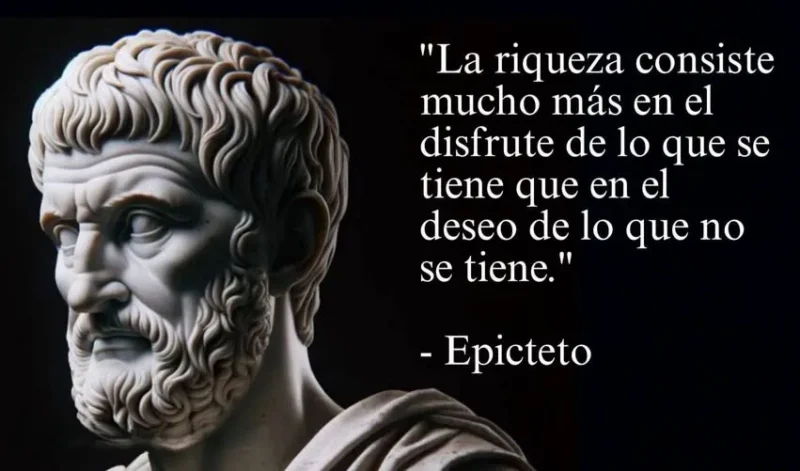The socioeconomic situation in which we Cubans find ourselves is very complex, stressful, and often suffocating. With so many problems we face daily and the poor conditions in which we live, we must seek, by every means, the resources to survive as best we can.
That’s why we must strengthen our minds, because everything seems to indicate that we cannot change our circumstances. Right now, although it may seem paradoxical, I remember the Spanish philosopher and essayist José Ortega y Gasset. Who made famous the expression: “I am myself and my circumstances, and if I don’t save them, I won’t save myself.”
My intention is to help people through thought and mental health. That’s why today I propose that we explore Stoicism. A philosophical school whose principles can constitute an antidote to dissatisfaction and a tool for well-being.
Many see Stoicism as a cold way of approaching life, but this is not the case. It is one of the most subtle philosophies to embrace as a companion to human existence. It originated in Ancient Greece, greatly influenced Christianity. Inspired many philosophers throughout history, and found empirical support in cognitive-behavioral therapy. Which adopted it as a very fertile tool for dealing with hardships and increasing well-being.
It is now in vogue. I have seen several Stoicism groups on Facebook, both in Spanish and English. Massimo Pigliucci, an American philosopher and biologist, professor of philosophy at City College of New York. And former editor-in-chief of the online magazine Scientia Salon, has contributed to the awareness and popularity of Stoicism in recent years. He is a critic of pseudoscience and an advocate for secularism and scientific education.
Pigliucci became a popularizer of Stoicism and one of the driving forces behind its resurgence in the United States at the beginning of the 21st century. His 2015 essay for The New York Times on the subject was one of the most shared articles to date. He stated that he always felt Stoicism was part of his Italian heritage. But that he came to practice it after becoming disenchanted with Buddhism. Although he finds similarities between the two schools of thought.
This American professor has a very prolific literary output. Including numerous scientific articles. In 2017, he published a book titled “How to Be a Stoic: Using Ancient Philosophy to Live a Modern Life.”
In 2019, he published “A Handbook for New Stoics: How to Thrive in a World Beyond Your Control.” In 2020, he published “The Stoic’s Guide to a Happy Life: 53 Short Lessons for Living.” These three books have been translated into many languages, including Spanish, and I recommend them here.
The history, emergence of Stoicism, its main figures, and some of the Stoics’ cardinal teachings will help you develop this perspective on life.
This is a philosophical school founded by Zeno of Citium in Athens at the beginning of the 3rd century BC. Also which quickly influenced the thinking of Roman philosophers. Among the Roman Stoics, Seneca, Epictetus, and Marcus Aurelius stand out. All of them influenced early Christians.
For example, Paul knew about Stoicism and knew Seneca’s brother. They also influenced later Christians such as Thomas Aquinas, Renaissance humanism, Francis Bacon, René Descartes, Baruch Spinoza, Montesquieu. As well as Protestantism, existentialism, and, as I mentioned before, cognitive-behavioral therapy.
The basic ethical conception of Stoicism is that the good lies not in external objects but in self-mastery. Our well-being should not depend on what happens in the world. On having material possessions or not having them, or on having affections or not having them.
This may seem exaggerated to you. Based on available scientific studies, we know that certain factors determine the well-being of most people. But there are individual differences. For example, some people may be happy alone in a natural environment, in the middle of a forest. But since we are social animals, this rarely happens to most people.
It is known that having three or four close loved ones and a slightly more diverse. Though not frequent, support network is usually part of the well-being of most people. Just as not being destitute, that is, having a minimum of material godos. It is also part of well-being for most people.

Stoicism found much empirical support in the studies of contemporary scientific psychology. Moreover is basically related to an idea that is very easy to state but very difficult to apply: Most of the things that affect us, said the Stoics, and Epictetus in particular, have nothing to do with what happens to us. But with how we evaluate (interpret) what happens to us.
It is not primarily the things that happen to us that generate a state of mind and a way of thinking about what happened. Also rather what we explain to ourselves about what happens. This inner wisdom about life is what can build human well-being. To this end, the Stoics proposed making a fundamental distinction: Which things depend on us and which don’t?
With each problem, it is worth asking ourselves whether it is up to us to solve it or not. If it isn’t up to us, the best thing we can do is focus on what does depend on us and not waste energy. For a Stoic, if we get angry, it’s because we’re internally consenting to the situation as being angry. We’re sort of accepting the angry situation. Because if someone insults me and I don’t get angry, that means I’m controlling myself and not considering that the situation necessarily has to make me angry.
When Socrates was insulted in Athens and didn’t respond, they would say, “Why don’t you respond?” And he would reply, more or less, “No, it doesn’t apply to me.” In other words, he didn’t accept that situation as worthy of anger. Perhaps he could have had another kind of response, indifference, for example.
Epictetus said that if we assent to something, it’s because it seems true to us. We can’t assent to what seems false to us because that’s the nature of the mind. To agree with what is true, disagree with what is false, and suspend judgment about what is doubtful.
So the first plan the Stoics propose is to examine our feelings and thoughts. Is what I’m feeling appropriate for this situation? Could it be appropriate, but I’m exaggerating? Is what I’m feeling really relative to this person I’m dealing with. Or am I carrying over an emotion from a previous situation that I’m somehow unloading on that other individual?
The principles of Stoic philosophy were based on four cardinal virtues:
- Practical knowledge: the ability to handle complex situations with a calm mind.
- Temperance: the ability to restrain and moderate the attraction of worldly pleasures and goods.
- Justice: being fair to others even when they have made a mistake or disrespected us.
- Courage: not only in extreme situations but in everyday life with clarity and integrity.
Make the best use of what is within your control and accept the rest as it happens. Some things depend on us, and others don’t. Our bodies, what we think, what we do, our opinions, actions, desires, and rejections depend on us. What others do, think, or say does not.
All of this is a bit like the Serenity Prayer, a prayer attributed to the theologian Reinhold Niebuhr. Best known for its opening lines: “Lord, grant me the serenity to accept all that I cannot change, / courage to change what I am capable of. / And wisdom to know the difference.”
And finally, we shouldn’t confuse Stoicism with resignation. What it’s telling us is that if changing the situation is truly beyond your control. Accepting it also has nothing to do with fatalism. With the idea that things will necessarily get worse.
- Personality Disorders: Understanding to Support and Accompany - 25 de February de 2026
- A Guide to Improving Our Mental Health - 16 de January de 2026
- How to Make Your New Year’s List - 5 de January de 2026

